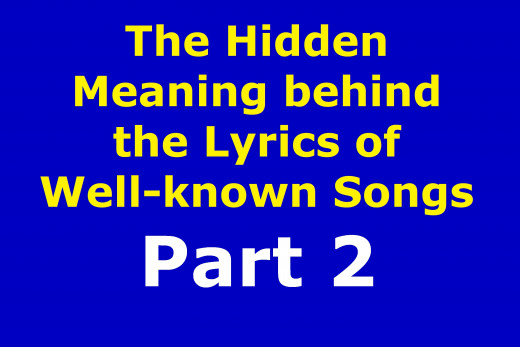The Hidden Meaning Behind the Lyrics of Well-Known Songs Part 2

Introduction to Part 2
Usually it is simple to interpret the lyrics of some great songs. Most have no profound meaning and just happen to have an appealing chorus, memorable riff, or easy to learn rhyming verses. However, many familiar songs with distinctive music have hidden meanings, which you may not be aware of, or over the years have misinterpreted. How many songs have you listened to and thought, “What is that song actually about?” Known the meaning of classic or popular song can give it a new sense of understanding and therefore a deeper appreciation. With the following interpretations, the aim is to give the reader a better insight into the true intentions of the artist(s) who wrote and recorded the song.
Contents
Beach Boys (The) Good Vibrations
Derek and the Dominos Layla
Dylan, Bob Like a Rolling Stone
Gaye, Marvin I Heard it Through the Grapevine
Led Zeppelin Stairway to Heaven
Simon and Garfunkel Bridge Over Troubled Water
Springsteen, Bruce Born to Run
Toto Africa
Tyler, Bonnie Total Eclipse of the Heart
Verve (The) Bittersweet Symphony
Good Vibrations Beach Boys
Composed by | Mike Love and Brian Wilson
An explanation from Brian Wilson referred to the song being rooted in his childhood when his mother had mentioned vibrations coming from invisible forces. She went on to explain that dogs barked at some people and not others because of the vibrations, good or bad they picked up from them.
When he went on to write the song with Mike Love these memories from his childhood returned and he compared these invisible forces, enlightenment, and spirituality to the sensual sights, smells, and sounds that are present during an encounter with another person, in this case a woman.
The song took six (or two*) months to record with fifteen (or seventeen*) recording sessions on a 100 (or 70*) hours of tape allegedly costing $50,000 (equivalent to over $400,000 today).
* The figures in brackets contradict themselves in a number of articles about the recording of the track, though all agree on the final cost.
Layla Derek and the Dominos
Composed by | Eric Clapton and Jim Gordon
Clapton stated that this song is about George Harrison’s wife, Pattie who Harrison was married to from 1966 until their divorce in 1977. It was released in 1970 and Pattie was unhappy that Clapton had publicly declared his love for her while she was still married to Harrison. Clapton eventually married Pattie in 1979 but the marriage ended in 1989.
The background to the song was that it was based on a book, Layla and Majnun, by the 12th Century Persian romantic poet Nizami Ganjavi, and was a story about a man who was in love with a woman he cannot have because her parents do not approve of him. In the end, he goes insane.
Like a Rolling Stone Bob Dylan
Composed by | Bob Dylan
Dylan stated that on a flight back from Britain he wrote twenty pages, which he initially intended to be for his novel ‘Tarantula’. Once back home he instead used these notes to form the foundations of the song ‘Like a Rolling Stone’.
The lyrics are addresses to an imaginary person ‘Miss Lonely’ who is portrayed, as rich and spoiled upper-class girl who has fallen from grace and now is homeless and living on the streets.
It has never been confirmed that the girl in the song is Edith (Edie) Sedgwick an American socialite who developed a crush on Dylan but she was unaware that he had secretly married his girlfriend Sara Lownds.
I Heard it Through the Grapevine Marvin Gaye
Composed by | Barrett Strong and Norman Whitfield
The song is about a person’s feelings of utter disbelief and betrayal when he hears, indirectly ‘through the grapevine’, that his girlfriend has been unfaithful.
As he still loves her, he is willing to give her the benefit of the doubt and hopes for a reconciliation but in the end he realises that this will never happen.
The idea for the song started in Chicago where Barrett Strong lived and where he said many people used the phrase ‘I heard it through the Grapevine’. Strong added that, as far as he knew, nobody had ever written a song about it so he sat down at the piano and came up with the bass line and then later, along with Norman Whitfield, completed the song.
Stairway to Heaven Led Zeppelin
Composed by | Jimmy Page and Robert Plant
Robert Plant states that the song’s meaning depends on ‘what day it is’. He said that even though he wrote the lyrics he still interprets the song in different ways.
He did eventually say that the song is about a woman who gets everything she wants without giving anything back who ultimately discovers that her life has no meaning and she would not get into heaven.
He also recalled that he was sitting holding a pencil and staring at a blank piece of paper when suddenly his hand started writing out the words. ‘I just sat there looking at the words and then almost leapt out of my seat’. This comment suggested that someone else had written the words using his hand as a guide.
Along with the suggestion that the song had backward messages, and Page’s connection to Aleister Crowley (who urged his followers to read and speak backwards), having bought his former home Boleskine House, many thought that this confirmed that the song was written by the Devil.
Plant responded to these rumours by stating that the song was written ‘…with the best of intentions. As far as reversing tapes and putting messages on the end, that’s not my idea of making music’.
Bridge Over Troubled Water Simon and Garfunkel
Composed by | Paul Simon
Paul Simon said that he had no idea where the song came from, and remembers thinking that it was considerably better than the songs he usually wrote. He did say that the overall theme is about providing comfort to someone in need.
Simon later cleared up the rumours about the line mentioning ‘silver girl’ being about a heroin needle, by stating that it was a private joke between him and his first wife Peggy Harper after she mentioned that she had found her first silver-grey hairs when she was only thirty.
Born to Run Bruce Springsteen
Composed by | Bruce Springsteen
Springsteen described the song as initially being about a boy and a girl looking for a connection, and wanting to run and keep on running without ever coming back. In the end, he said that it was about two people trying to find their way home.
While working on some song ideas he said that the words ‘born to run’ came to him. He added that he liked the phrase as it suggested cinematic drama.
Africa Toto
Composed by | David Paich and Jeff Porcaro
Paich explained that the song is about a man’s love of the continent Africa, rather than just a personal love story. His childhood teachers told him that the people of Africa would bless the rain that fell on their villages.
He added that he had just sat down at a new keyboard he had purchased when the song flowed out, appearing to come from a ‘higher place’. He remembers thinking ‘hang on, I’m a talented songwriter, but not this talented’.
The strange lyric ‘as sure as Kilimanjaro rises like Olympus above the Serengeti’ is due to the fact Paich had never visited Africa and his only imagery for the lyrics came from pictures in the National Geographic, as you would not see a lot of Kilimanjaro from the Serengeti due to it being over 250 miles away.
Total Eclipse of the Heart Bonnie Tyler
Composed by | Jim Steinman
Steinman said that the original title for the song was ‘Vampires in Love’ because he was working on a Nosferatu musical at the time. Adding the lyrics were, all about the darkness, the power of the darkness, and love’s place in the darkness.
Steinman said that the song was a ‘Wagnerian-like onslaught of sound and emotion’.
Bittersweet Symphony The Verve
Composed by | Richard Ashcroft, Mick Jagger, Keith Richards
Ashcroft considered the whole of life to be a ‘bittersweet’ experience as he said that he perceives it as one where you are trapped and powerless to change anything, and ceaselessly working to make ends meet as your life passes by only to inescapably die in the end. A continual battle between the life you want to have and the life you are obligated to have.
The well-known orchestral arrangement was taken from a symphonic version of the Rolling Stones song ‘The Last Time’ recorded in 1965 by the Andrew Oldham Orchestra. At the time, Oldham was the Rolling Stones manager and record producer.
The Verve were given permission by the Decca record label to use ‘a few notes’ from the string melody in exchange for 50% of the royalties from the song.
The band were sued by Allen Klein, who was the manager for The Rolling Stones in the late 1960’s and owned the copyright through 1970 for having used far more of the string melody than had been agreed.
In 1977, The Verve settled with Klein and gave its publishing royalties to Klein’s company ABKCO Records. They also added Jagger and Richards to the songwriter credits.
In 1999, Andrew Oldham sued The Verve for $1.7 million in songwriter royalties. As a result of both lawsuits against The Verve all royalty payments went to Jagger, Oldham, and Richards.
It was only in 2019 that Ashcroft announced that Jagger and Richards had signed over the publishing rights for the song, saying that ‘it was a truly kind and magnanimous thing for them to do’.
Resources and Comment
Apart from an individual artist or group, radio stations, newspapers, and magazines own websites, there are also many specialised websites that offer explanations as to the background and meaning of songs and their lyrics.
If you have a favourite song that you would like to know the meaning of the lyrics please let me know.
© 2020 Brian OldWolf








